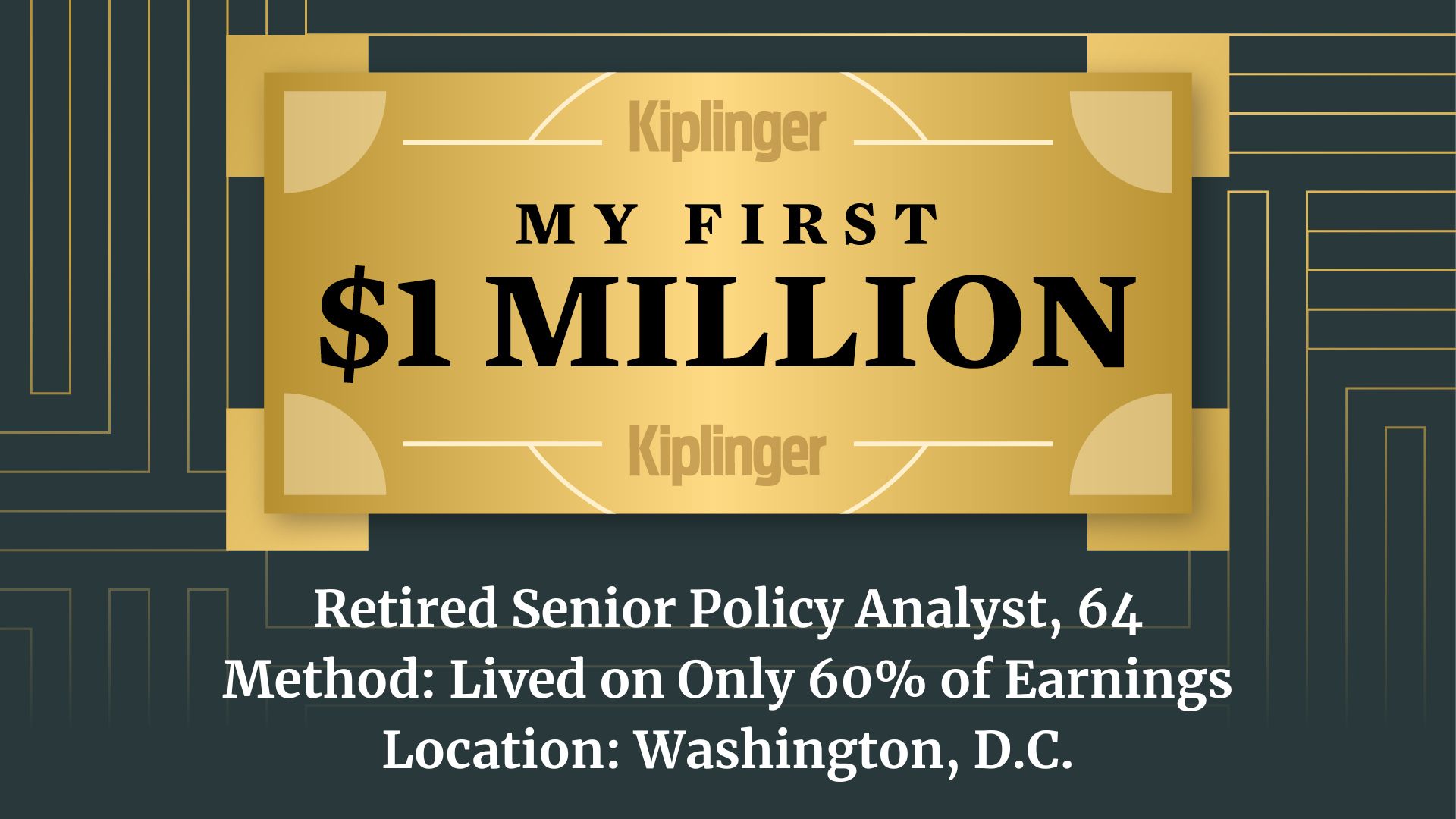Best No-Penalty CD Rates: Lock in Rates at 4%
No-penalty CDs provide a high return while giving you the flexibility to access your cash whenever needed. Check out Kiplinger's top finds.

Profit and prosper with the best of Kiplinger's advice on investing, taxes, retirement, personal finance and much more. Delivered daily. Enter your email in the box and click Sign Me Up.
You are now subscribed
Your newsletter sign-up was successful
Want to add more newsletters?

Delivered daily
Kiplinger Today
Profit and prosper with the best of Kiplinger's advice on investing, taxes, retirement, personal finance and much more delivered daily. Smart money moves start here.

Sent five days a week
Kiplinger A Step Ahead
Get practical help to make better financial decisions in your everyday life, from spending to savings on top deals.

Delivered daily
Kiplinger Closing Bell
Get today's biggest financial and investing headlines delivered to your inbox every day the U.S. stock market is open.

Sent twice a week
Kiplinger Adviser Intel
Financial pros across the country share best practices and fresh tactics to preserve and grow your wealth.

Delivered weekly
Kiplinger Tax Tips
Trim your federal and state tax bills with practical tax-planning and tax-cutting strategies.

Sent twice a week
Kiplinger Retirement Tips
Your twice-a-week guide to planning and enjoying a financially secure and richly rewarding retirement

Sent bimonthly.
Kiplinger Adviser Angle
Insights for advisers, wealth managers and other financial professionals.

Sent twice a week
Kiplinger Investing Weekly
Your twice-a-week roundup of promising stocks, funds, companies and industries you should consider, ones you should avoid, and why.

Sent weekly for six weeks
Kiplinger Invest for Retirement
Your step-by-step six-part series on how to invest for retirement, from devising a successful strategy to exactly which investments to choose.
If you have short-term savings goals but don't want to tie up your money in a longer CD, a no-penalty CD offers the best of both worlds. You'll earn a rate that beats inflation while maintaining quick access to your funds.
Normally, a certificate of deposit is a "park the money and forget about it" type of savings vehicle. However, with a no-penalty CD, you can access your money when needed without paying fees.
Moreover, even with the Federal Reserve cutting rates at its last three meetings, APYs remain high. Now is an excellent time to lock in higher rates.
Best no-penalty CD rates
Here's a look at the best no-penalty CD. Note, I update these bi-weekly:
Account | APY | Min. Deposit | Terms | Withdrawal frequency |
|---|---|---|---|---|
4.00% | $1,000 | 9 months | Once per month | |
3.95% | $500 | 11 months | Whenever, past the first 7 days of account opening | |
3.90% | $500 | 11 months | Whenever, past the first 7 days of account opening | |
3.75% | $1 | 5 months | Whenever, past the first 6 days of account opening | |
3.70% | $500 | 12 months | Can withdrawal fee-free for first 5 days of each calendar month |
How does withdrawing funds from a no-penalty CD work?
With a no-penalty CD, you'll have to wait a week after funding the account before you can withdraw funds. While penalty-free withdrawal can be useful if you think you might need the cash at some point in the foreseeable future, keep in mind that it's not as easy as withdrawing from a traditional savings account.
You'll need to notify your bank before taking out funds. Additionally, many institutions require you to withdraw all cash from an account, not just a partial amount, if you decide to "break open" your CD.
In other instances, you might be able to withdraw a portion of your funds. But you'll only be able to do one withdrawal per month.
If you're concerned about having more regular access to your accounts, a high-yield savings account might be a better fit.
Opening a no-penalty CD account
Like other CD accounts, no-penalty CDs offer higher APYs on deposits than traditional savings accounts. With a no-penalty CD, you'll lock in an APY when opening the account. If banks drop rates, your APY won't be affected.
Therefore, they're good savings options for individuals who want guaranteed returns on their savings but don't want to commit to a traditional CD account in case they need access to their cash before the CD maturity date.
Most of the time, no-penalty CDs have relatively short terms, typically under 14 months.
Use the tool below, powered by Bankrate, to quickly compare the rates of some of the top CD accounts available now:
On the other hand, since there are no penalties for withdrawing your cash early, you have the option to put your money in a new CD account if rates go up. Our savings calculator can help you determine how much interest you earn.
Before opening any savings account, it's vital to make sure your bank is federally insured. Banks that are FDIC-insured protect up to $250,000 in individual deposit accounts and up to $250,000 for each person's share of joint accounts.
Deposits in federal credit unions are covered by the National Credit Union Administration (NCUA), protecting up to $250,000 per credit union member (whether in an individual or a joint account).
No-penalty CDs vs savings accounts
| Header Cell - Column 0 | No-Penalty CD | Savings Account |
|---|---|---|
Interest Rates | Fixed. | Variable. |
Access to funds | You will need to wait seven days after opening the account to access funds. You also need to give your bank advance notice before withdrawing cash. | Cash can be accessed at any time. |
Term | Typically under 14 months. | None. |
Minimum Deposit | Minimum deposit requirements vary from bank to bank. | Often require a low minimum deposit or none at all. |
Withdrawals/Deposits | Partial withdrawals and additional deposits after the opening of the account are not allowed. | Funds can be withdrawn or deposited anytime. |
Pros of no-penalty CDs:
- Accessibility: No-penalty CDs allow you to withdraw funds before the CD's maturity date. If an emergency were to arise, you wouldn't have to pay a hefty fee to take out your cash, which can give individuals peace of mind.
- Maximize earnings: Since no-penalty CDs allow you to take out cash for no fee, it's beneficial if banks raise rates. You'll be able to withdraw and place them in an account with a higher APY.
- Guaranteed returns: Because most CD accounts are FDIC-insured and offer higher APYs than traditional savings accounts, they offer fixed, predictable and safe returns on savings.
Cons of no-penalty CDs:
- Regular CD rates: Usually, no-penalty CDs don't offer APYs as high as those on a standard CD account. And if inflation continues to rise, it might make sense to consider options with higher returns and risk on the stock market to outpace it.
- No partial withdrawal: If you decide to "break open" your no-penalty CD, you'll likely have to withdraw your entire savings, not just a partial amount. With some accounts, you can withdraw only a portion of your deposit, but they'll limit how many transactions you can make.
- No additional deposits: Like standard CD accounts, in most cases, cash can only be deposited upon opening the non-penalty CD. No additional deposits can be made.
Bottom line on the best no-penalty CD rates
If you're unsure whether or not you'll need to access funds from your CD before its maturity date, a no-penalty CD can be a good option. With a no-penalty CD, you won't be charged an additional fee if you decide to withdraw your balance before the term is through.
One thing to keep in mind is that interest rates might drop again, as many economists predict at least one rate cut in 2026. So, locking in a great rate now ensures you earn a healthy return that outpaces inflation while helping you reach your savings goals.
Related Content
Profit and prosper with the best of Kiplinger's advice on investing, taxes, retirement, personal finance and much more. Delivered daily. Enter your email in the box and click Sign Me Up.

Sean is a veteran personal finance writer, with over 10 years of experience. He's written finance guides on insurance, savings, travel and more for CNET, Bankrate and GOBankingRates.
-
 Dow Absorbs Disruptions, Adds 370 Points: Stock Market Today
Dow Absorbs Disruptions, Adds 370 Points: Stock Market TodayInvestors, traders and speculators will hear from President Donald Trump tonight, and then they'll listen to Nvidia CEO Jensen Huang tomorrow.
-
 Quiz: Do You Know How to Maximize Your Social Security Check?
Quiz: Do You Know How to Maximize Your Social Security Check?Quiz Test your knowledge of Social Security delayed retirement credits with our quick quiz.
-
 Will You Get a Trump Tariff Refund in 2026? What to Know Now
Will You Get a Trump Tariff Refund in 2026? What to Know NowTax Law The Supreme Court's tariff ruling has many wondering about refund rights and how tariff refunds would work.
-
 Where Olympians Store Their Medals is a Great Lesson For Your Valuables and Cash
Where Olympians Store Their Medals is a Great Lesson For Your Valuables and CashWhat you can learn about protecting your cash and values from where Olympians store their medals.
-
 An Executive's 'Idiotic' Idea: Skip Safety Class and Commit a Federal Crime
An Executive's 'Idiotic' Idea: Skip Safety Class and Commit a Federal CrimeSeveral medical professionals reached out to say that one of their bosses suggested committing a crime to fulfill OSHA requirements. What's an employee to do?
-
 How You Can Use the Financial Resource Built Into Your Home to Help With Your Long-Term Goals
How You Can Use the Financial Resource Built Into Your Home to Help With Your Long-Term GoalsHomeowners are increasingly using their home equity, through products like HELOCs and home equity loans, as a financial resource for managing debt, funding renovations and more.
-
 How to Find Free Money for Graduate School as Federal Loans Tighten in 2026
How to Find Free Money for Graduate School as Federal Loans Tighten in 2026Starting July 1, federal borrowing will be capped for new graduate students, making scholarships and other forms of "free money" vital. Here's what to know.
-
 First the Penny, Now the Nickel? The New Math Behind Your Sales Tax and Total
First the Penny, Now the Nickel? The New Math Behind Your Sales Tax and TotalRounding Tax A new era of "Swedish rounding" hits U.S. registers soon. Learn why the nickel might be on the chopping block, and how to save money by choosing the right way to pay.
-
 My First $1 Million: Retired Senior Policy Analyst, 64, Washington, D.C.
My First $1 Million: Retired Senior Policy Analyst, 64, Washington, D.C.Ever wonder how someone who's made a million dollars or more did it? Kiplinger's My First $1 Million series uncovers the answers.
-
 Money Monsters Under the Bed? Here's What You're Really Afraid Of
Money Monsters Under the Bed? Here's What You're Really Afraid OfWhen financial anxiety keeps you awake, money isn't usually the root cause of the problem. Identifying the real demons will help you sleep — and live — better.
-
 Finances Not Going Anywhere? These 3 Steps Can Help You Find Your North Star
Finances Not Going Anywhere? These 3 Steps Can Help You Find Your North StarIf you're overwhelmed by financial planning, a long list of to-dos won't help. Find clarity by focusing on steps built around what's most important to you.